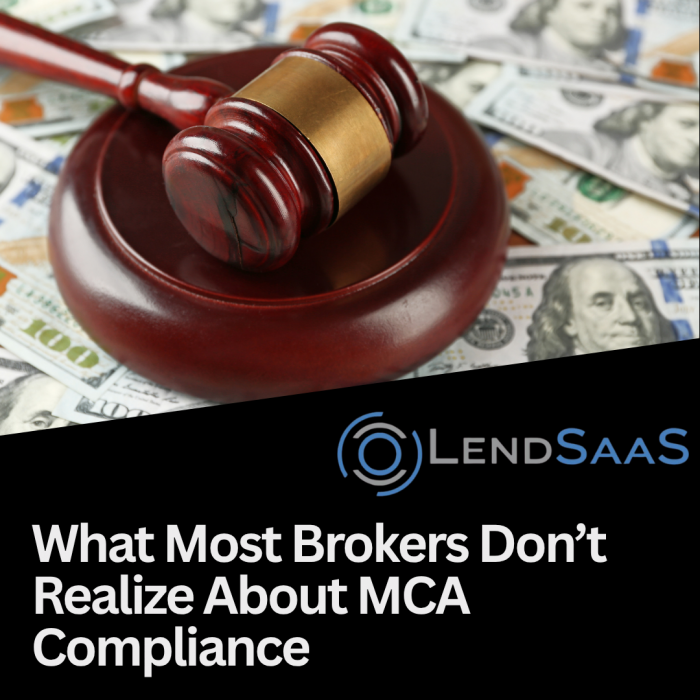In the fast-paced world of Merchant Cash Advance (MCA), most brokers focus on one thing — closing deals. But in 2025, speed without MCA compliance is a ticking time bomb.
As new disclosure laws, UCC requirements, and data-security standards expand across states, many brokers are realizing (too late) that compliance isn’t just a funder’s problem — it’s theirs too.
Whether you’re running an ISO or brokering a few deals a month, ignoring MCA compliance can result in delays, rejected applications, fines, and even lost partnerships.
Let’s break down what’s changing, where brokers slip up, and how to stay ahead with a clear MCA Compliance Checklist you can actually use.
Why MCA Compliance Suddenly Matters More Than Ever
For years, MCA operated in a gray zone — fast capital with flexible rules. But regulators have caught up.
States like California, New York, Virginia, and Utah have introduced new disclosure requirements, borrower-rights notices, and standardized documentation. Others are close behind.
That means what you used to do informally — like quoting a merchant over the phone or sending an incomplete application — could now violate disclosure laws.

The problem: most brokers don’t realize these rules apply to them as intermediaries, not just to the funders.
If your funder gets audited and your submission is missing disclosures or inaccurate cost data, the non-compliance flows upstream to you.
The Most Common Compliance Mistakes MCA Brokers Make
Here’s where most brokers get burned — and where automation (like what LendSaaS provides) prevents it.
- Inconsistent cost disclosures: not presenting merchants with a clear, compliant cost summary — including factor rates, repayment terms, and estimated APR equivalents.
- State-specific omissions: using a “one-size-fits-all” form when California, New York, and others require specific language and formatting.
- Missing digital audit trails: failing to store timestamps of when and how merchants reviewed or signed disclosures.
- Poor document organization: relying on email threads and Google Drive folders instead of a centralized, trackable system.
- Lack of broker training: teams aren’t briefed on updated laws, which change yearly — or quarterly in some states.
- Data security gaps: collecting sensitive merchant data (bank statements, SSNs) through unencrypted emails instead of secure upload portals.
- Failure to renew UCC filings: losing lien priority or exposing your funder to competing claims.
Each of these mistakes can be avoided with the right structure — which brings us to your must-have MCA Compliance Checklist.
🧾 The Ultimate MCA Compliance Checklist (2025 Edition)
Use this checklist to ensure your deals stay clean, consistent, and audit-proof. Bookmark it, print it, or integrate it into your workflow — ideally, right inside your CRM.
1. Merchant Disclosures
- Provide written disclosure before the merchant signs or commits.
- Include: total advance amount, payback amount, factor rate, estimated APR (if required), and all fees.
- Use the latest state-specific templates (e.g., California DFPI, NYDFS).
- Capture timestamps and proof of acknowledgment.
2. Application & Data Handling
- Collect merchant data via secure, encrypted channels.
- Verify identity and bank ownership through a verified API (DecisionLogic, Plaid, etc.).
- Never email raw PDFs with sensitive data — use secure uploads.
- Store all application data in a compliant, access-restricted database.
3. UCC Filing & Renewal
- File a UCC-1 immediately after funding.
- Confirm accuracy of business name, address, and EIN.
- Set automated renewal reminders (UCCs expire every 5 years).
- Record filing confirmation numbers in your CRM for audit tracking.
4. Compliance by State
- Maintain an updated database of state disclosure laws.
- Use automation to trigger the correct disclosure template based on merchant state.
- Stay informed about upcoming regulations in Illinois, Florida, and Texas (pending legislation).
5. Broker Communication
- Ensure all quotes and offers match disclosure data exactly.
- Train sales reps on approved language — no verbal “estimates.”
- Document all merchant interactions in CRM notes or call logs.
6. Document Storage & Audit Trail
- Store all signed forms, disclosures, and contracts in one place.
- Keep at least 3 years of digital records.
- Log all edits and updates (who made them, when, and why).
- Ensure audit logs are non-editable and time-stamped.
7. Payment & Servicing
- Only use verified payment processors (like Actum Processing).
- Automate payment tracking to prevent missed or double debits.
- Flag any payment changes for compliance review.
8. Merchant Privacy & Data Security
- Encrypt all sensitive data at rest and in transit.
- Limit access to verified personnel only.
- Follow GDPR/CCPA standards for data requests and deletion.
9. Renewal & Re-Funding
- Treat renewals as new transactions for disclosure purposes.
- Generate fresh documents with updated cost breakdowns.
- Re-verify banking and UCC filings.
10. Platform & Vendor Compliance
- Audit your CRM and integrated tools for data security certifications (SOC 2, ISO 27001).
- Ensure your CRM logs compliance events automatically.
- Prefer platforms with built-in disclosure, UCC, and ACH automation (like LendSaaS).
Automation: The Secret Weapon of Compliant Brokers
The truth is, even the best brokers can’t keep up manually. Laws evolve, states update templates, and every new deal adds risk.
That’s why leading MCA teams are shifting to platforms like LendSaaS, which:
- Auto-generates and attaches the right disclosure forms based on merchant location.
- Tracks timestamps and merchant signatures automatically.
- Integrates with Actum, DecisionLogic, and other partners for end-to-end compliance.
- Creates audit-ready trails for every deal — no manual work required.
When compliance happens automatically, brokers get to focus on funding deals, not chasing paperwork.
Don’t Wait for an Audit to Get Compliant
Every broker who’s been through an MCA compliance audit says the same thing: “I wish we’d taken it seriously sooner.”
In 2025, regulators aren’t asking if your disclosures are compliant — they’re assuming they should be.
Start using a true MCA platform built for compliance, not one patched together from generic CRMs.
If your current system can’t automatically handle disclosures, UCCs, or audit logs, you’re already behind.
Schedule a demo with us today and learn how LendSaaS can ensure your MCA business is always staying compliant.


Leave a Reply